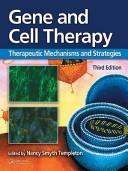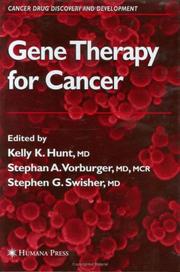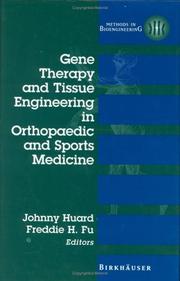
ISBN: 9780849387685 Year: 2009 Publisher: Cleveland CRC Press
Abstract | Keywords | Export | Availability | Bookmark
 Loading...
Loading...Choose an application
- Reference Manager
- EndNote
- RefWorks (Direct export to RefWorks)
Periodical
Abstract | Keywords | Export | Availability | Bookmark
 Loading...
Loading...Choose an application
- Reference Manager
- EndNote
- RefWorks (Direct export to RefWorks)
Cancer --- Gene therapy
Book
Year: 2015 Publisher: Amsterdam, [Netherlands] : Academic Press,
Abstract | Keywords | Export | Availability | Bookmark
 Loading...
Loading...Choose an application
- Reference Manager
- EndNote
- RefWorks (Direct export to RefWorks)
Gene Therapy for Viral Infections provides a comprehensive review of the broader field of nucleic acid and its use in treating viral infections. The text bridges the gap between basic science and important clinical applications of the technology, providing a systematic, integrated review of the advances in nucleic acid-based antiviral drugs and the potential advantages of new technologies over current treatment options. Coverage begins with the fundamentals, exploring varying topics, including harnessing RNAi to silence viral gene expression, antiviral gene editing, viral gene therapy vec.--
Book
ISBN: 0511883404 0511663358 Year: 1998 Publisher: Cambridge : Cambridge University Press,
Abstract | Keywords | Export | Availability | Bookmark
 Loading...
Loading...Choose an application
- Reference Manager
- EndNote
- RefWorks (Direct export to RefWorks)
The clinical applications of human gene therapy have been particularly fruitful in oncology, and in the last few decades there has been explosive growth in understanding of the genetic lesions leading to neoplasia. This volume in the series Cancer: Clinical Science in Practice reviews progress in the basic and clinical science of gene therapy in oncology, and looks forward to future developments. It considers what has worked and what has not in the fast-evolving field of gene therapy, drawing on laboratory studies and clinical trials, including the work of the contributors themselves. Topical and authoritative, volumes in this series are intended for a wide audience of clinicians and researchers with an interest in the applications of biomedical science to the understanding and management of cancer.
Cancer --- Gene therapy.

ISBN: 9781588294722 9781597452229 Year: 2007 Publisher: Totowa, NJ Humana Press Inc.
Abstract | Keywords | Export | Availability | Bookmark
 Loading...
Loading...Choose an application
- Reference Manager
- EndNote
- RefWorks (Direct export to RefWorks)
The possibility of treating cancer, a disease defined by genetic defects, by introducing genes targeting these very alterations has led to an immense interest in gene therapy for cancer. Although incremental successes have been realized, enthusiasm for gene therapy has declined due to an increasing number of obstacles. These obstacles include vector systems that do not reach systemic metastases, therapeutic genes with redundant mec- nisms allowing for cellular resistance, and toxicities in clinical trials leading to premature closure of these studies. Different tactics to overcome or circumvent these obstacles have catalyzed the development of a wide range of gene therapy approaches. Thus far, almost two-thirds of gene therapy trials have focused on cancer. This reflects the concept that gene therapy approaches for the treatment of cancer do not necessarily require long-term expression of the gene as is necessary for the treatment of primary genetic defects like hemophilia or juvenile diabetes. Unlike the treatment of genetic defects, where expr- sion of the corrected gene needs to be strong, permanent and, sometimes regulated, tactics to treat tumors can be based on temporary and locally limited effects. In addition, cancer cells have different properties than normal cells and this allows for targeting gene therapy to specific cells, a major advantage over current antitumor therapies, which are also toxic to normal cells and tissues.
Cancer --- Cancer. --- Gene Therapy --- Gene therapy. --- Neoplasms --- Methods. --- Genetics. --- Therapy.
Book
ISBN: 1493997408 1493997394 Year: 2020 Publisher: New York, NY : Springer US : Imprint: Humana,
Abstract | Keywords | Export | Availability | Bookmark
 Loading...
Loading...Choose an application
- Reference Manager
- EndNote
- RefWorks (Direct export to RefWorks)
This third edition provides in-depth knowledge on the delivery of naked DNA and small-interfering RNA (siRNA) to the targeted microorganism, mammalian single cells, tissues, and animals for prevention and treatment of disease. It builds on the success of the first edition and on the progress made in siRNA delivery and DNA vaccines for large animals as well as discovery of electroporation applications for the fragile tissues and for internal organs. Written in the highly successful Methods in Molecular Biology series format, chapters include introductions to their respective topics, lists of the necessary materials and reagents, step-by-step, readily reproducible laboratory protocols, and tips on troubleshooting and avoiding known pitfalls. Authoritative and easily accessible, Electroporation Protocols: Microorganism, Mammalian System, and Nanodevice, Third Edition aims to be an invaluable resource for investigators both in and outside of this field. .
Gene therapy. --- Gene Therapy. --- Therapy, Gene --- Genetic engineering --- Therapeutics

ISBN: 0412625504 9780412625503 Year: 1995 Publisher: London: Chapman and Hall,
Abstract | Keywords | Export | Availability | Bookmark
 Loading...
Loading...Choose an application
- Reference Manager
- EndNote
- RefWorks (Direct export to RefWorks)
Gene therapy. --- Genetic vectors. --- Genetic vectors --- Gene therapy

ISBN: 0817640711 Year: 2000 Publisher: Boston (Mass.) : Birkhäuser,
Abstract | Keywords | Export | Availability | Bookmark
 Loading...
Loading...Choose an application
- Reference Manager
- EndNote
- RefWorks (Direct export to RefWorks)
Gene therapy. --- Musculoskeletal system --- Orthopedics. --- Sports medicine. --- Diseases --- Gene therapy.
Periodical
Abstract | Keywords | Export | Availability | Bookmark
 Loading...
Loading...Choose an application
- Reference Manager
- EndNote
- RefWorks (Direct export to RefWorks)
Cancer --- Neoplasms --- Genetic Therapy --- Cancer --- Gene therapy --- Gene therapy.
Book
ISBN: 0309495873 0309495857 Year: 2019 Publisher: Washington, District of Columbia : The National Academies Press,
Abstract | Keywords | Export | Availability | Bookmark
 Loading...
Loading...Choose an application
- Reference Manager
- EndNote
- RefWorks (Direct export to RefWorks)
"On April 23 and 24, 2019 the Forum on Neuroscience and Nervous System Disorders convened a workshop titled "Advancing Gene-Targeted Therapies for Central Nervous System Disorders" in Washington, DC. This public workshop brought together experts and key stakeholders from academia, government, industry, philanthropic foundations, and disease/patient-focused nonprofit organizations to explore approaches for advancing the development of gene-targeted therapies for central nervous system (CNS) disorders, and implications of developing these therapies. Participants explored lessons learned from both successful and unsuccessful clinical development programs; new knowledge about the genetic underpinnings of brain disorders; the current status and future potential of gene-targeted therapies for CNS disorders; challenges and potential solutions for translating preclinical findings to approved therapies; and patient and caregiver perspectives. They also discussed what will be needed to develop these therapies for common disorders such as Alzheimer's and Parkinson's disease, as well as neuropsychiatric and neurodevelopmental disorders such as schizophrenia and autism. The workshop included approaches that target both DNA and RNA, as well as gene products using viral vectors, antisense oligonucleotides, and RNA interference. This publication summarizes the presentations and discussion of the workshop"--Publisher's description
Nervous system --- Diseases --- Gene therapy.

 Search
Search Feedback
Feedback About UniCat
About UniCat  Help
Help News
News